|
|
|
Sort Order |
|
|
|
Items / Page
|
|
|
|
|
|
|
| Srl | Item |
| 1 |
ID:
108102
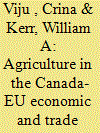

|
|
|
| 2 |
ID:
065337
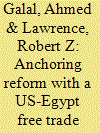

|
|
|
|
|
| Publication |
Washington DC, Institute For International Economics, 2005.
|
| Description |
xi, 77p.
|
| Standard Number |
0881323683
|
|
|
|
|
|
|
|
|
|
|
|
Copies: C:1/I:0,R:0,Q:0
Circulation
| Accession# | Call# | Current Location | Status | Policy | Location |
| 050056 | 382.973062/GAL 050056 | Main | On Shelf | General | |
|
|
|
|
| 3 |
ID:
137813
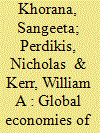

|
|
|
|
|
| Summary/Abstract |
Economies of scale are an alternative source of growth particularly at a time when countries are suffering from global economic malaise. The proposed EU-India free trade agreement holds substantial promise as this will create a combined market of over one and a half billion and generate economies of scale from intra-industry trade, which are likely to be concentrated in manufactured products such as chemicals, machinery and transport equipment. Bold action is needed on the part of politicians in both the EU and India to successfully negotiate the agreement given that this will enable both countries to reap the efficiency gains of global economies of scale, provide a significant competitive advantage over other major economies and deliver the necessary spur to shake both the EU and India out of their current economic stagnation.
|
|
|
|
|
|
|
|
|
|
|
|
|
|
|
|
| 4 |
ID:
093345
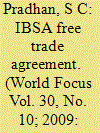

|
|
|
| 5 |
ID:
154050
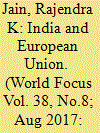

|
|
|
|
|
| Summary/Abstract |
This article provides a broad overview of relations between the European Economic Community (EEC)/European Union (EU) since the Treaty of Rome to the present. It discusses initial Indian perceptions of the EEC, the institutional architecture of dialogue and interaction and focuses on the convergence and divergence on a number of political issues, including global governance.
|
|
|
|
|
|
|
|
|
|
|
|
|
|
|
|
| 6 |
ID:
124318
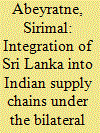

|
|
|
|
|
| Publication |
2013.
|
| Summary/Abstract |
The purpose of this article is to examine the role of Indo-Lanka Free Trade Agreement (FTA) in integration of Sri Lanka into the Indian manufacturing processes in line with emerging trade patterns based on 'global product sharing'. While Sri Lanka has established close economic ties with India in general, the FTA (2000) has led to a 'zero'-tariff regime covering a bulk of their bilateral trade. However, there is no evidence to support the popular perceptions about the deeper integration of Sri Lanka into Indian supply chains. While the expansion of Sri Lanka's trade with India under the FTA has revealed peculiar outcomes, the 'old-style' trade integration between the two countries has remained virtually unchanged. Trade and growth patterns in both Sri Lanka and India are different from the experience of East and South-east Asian countries which created opportunities to accommodate globalized supply chains of fragmented manufacturing processes.
|
|
|
|
|
|
|
|
|
|
|
|
|
|
|
|
| 7 |
ID:
140090
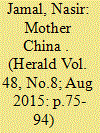

|
|
|
| 8 |
ID:
102939
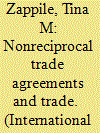

|
|
|
|
|
| Publication |
2011.
|
| Summary/Abstract |
The recent proliferation of preferential trade agreements, reaching almost 400 in number, has made it increasingly important to determine their effects on trade flows. This study advances our understanding of the effect of a particular type of trade agreement, a nonreciprocal agreement between a major economic power and less developed countries often used as a foreign policy/foreign aid tool by the major power and allowable under WTO Special and Differential Treatment. The study tests the effect of a recently implemented nonreciprocal agreement between the United States and sub-Saharan Africa, the 2000 African Growth and Opportunity Act (AGOA), on trade. A traditional gravity model is employed to test whether AGOA opens market access in the United States for eligible countries' exports. The results of this study suggest that AGOA membership and eligibility for AGOA textile benefits have no significant effect on trade, an explicit goal of this agreement. Uncertainty about the expiration of preferences, eroding preferential margins, and the inability of African producers to adequately exploit preferences are explanations for these results.
|
|
|
|
|
|
|
|
|
|
|
|
|
|
|
|
| 9 |
ID:
137207
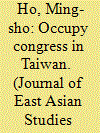

|
|
|
|
|
| Summary/Abstract |
In opposition to a free trade pact with China, Taiwan's Sunflower Movement erupted in spring 2014 and occupied the national legislature for twenty-four days. Drawing from the recent debates on the relation between social movements and the state, I elaborate a revised polity model that focuses on the effects of elite disunity, threat, and movement strategy. The Sunflower Movement originated from a tactical misstep by the ruling party that created an immediate sense of threat from proposed closer economic ties with China, thereby facilitating protest mobilization. Student protesters were able to seize the national legislature because of an internal split within the ruling party and support from the opposition party. However, the failure to further exploit these favorable opportunities exposed the movement to government repression. Fortunately for the movement, the disunity among elites helped the activists manage a dignified exit, which they could claim as a success.
|
|
|
|
|
|
|
|
|
|
|
|
|
|
|
|
| 10 |
ID:
131000
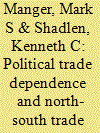

|
|
|
|
|
| Publication |
2014.
|
| Summary/Abstract |
Why do developing countries negotiate North-South trade agreements, when they already enjoy preferential market access to developed-country markets? Most developing countries benefit from the generalized system of preferences (GSP) and related schemes when they export to the United States, the EU, and other developed economies. And yet, many pursue fully reciprocal agreements that require major concessions to the developed partner. We argue that this is due to the nature of the GSP as a unilateral concession that can be (and often is) taken away. High dependence on unilateral, removable preferences generates "political trade dependence" (PTD). We distinguish PTD from standard measures of trade dependence, and we explain why PTD motivates developing countries to seek North-South Regional Trade Agreements (RTAs). We show the effects of PTD with a selection of illustrative cases and test our hypothesis on a data set of EU and US trade agreements with developing countries. We find robust statistical support for our hypothesis that high and rising levels of PTD make the negotiation of a North-South RTA more likely.
|
|
|
|
|
|
|
|
|
|
|
|
|
|
|
|
| 11 |
ID:
171885
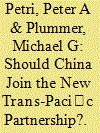

|
|
|
|
|
| Summary/Abstract |
After President Donald Trump’s ill-advised pullout from the Trans-Pacic Partnership (TPP) and despite the absence of the US, the remaining 11 Asian and Pacic countries agreed on a deal, renamed the Comprehensive and Progressive Agreement for Trans-Pacic Partnership (CPTPP). The accord took effect on 30 December 2018 and provides rigorous, up-to-date rules for Asia−Pacic trade, but excludes the region’s two biggest economies: the US and China. In this paper, we calculate that Chinese membership in the CPTPP would yield large economic and political benefits to China and other members. The CPTPP, in its current form, would generate global income gains estimated at US$147bn annually. If China were to join, these gains would quadruple to US$632bn, or a quarter more than in the original TPP with the US. But to join the CPTPP, China would have to undertake unprecedented reforms and manage complex political challenges
|
|
|
|
|
|
|
|
|
|
|
|
|
|
|
|
|
|
|
|
|